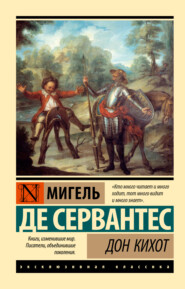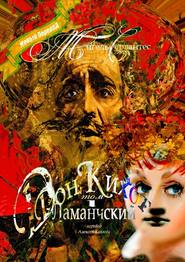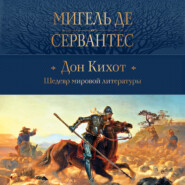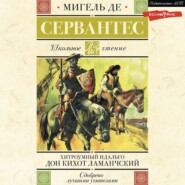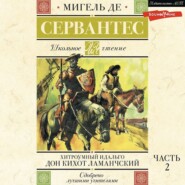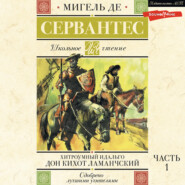По всем вопросам обращайтесь на: info@litportal.ru
(©) 2003-2025.
✖
Don Quixote
Настройки чтения
Размер шрифта
Высота строк
Поля
It seems that as he stood contemplating his enemy she struck him as the most beautiful woman he had ever seen all his life; and the little blind boy whom in our streets they commonly call Love had no mind to let slip the chance of triumphing over a lacquey heart, and adding it to the list of his trophies; and so, stealing gently upon him unseen, he drove a dart two yards long into the poor lacquey's left side and pierced his heart through and through; which he was able to do quite at his ease, for Love is invisible, and comes in and goes out as he likes, without anyone calling him to account for what he does. Well then, when they gave the signal for the onset our lacquey was in an ecstasy, musing upon the beauty of her whom he had already made mistress of his liberty, and so he paid no attention to the sound of the trumpet, unlike Don Quixote, who was off the instant he heard it, and, at the highest speed Rocinante was capable of, set out to meet his enemy, his good squire Sancho shouting lustily as he saw him start, "God guide thee, cream and flower of knights-errant! God give thee the victory, for thou hast the right on thy side!" But though Tosilos saw Don Quixote coming at him he never stirred a step from the spot where he was posted; and instead of doing so called loudly to the marshal of the field, to whom when he came up to see what he wanted he said, "Senor, is not this battle to decide whether I marry or do not marry that lady?" "Just so," was the answer. "Well then," said the lacquey, "I feel qualms of conscience, and I should lay a-heavy burden upon it if I were to proceed any further with the combat; I therefore declare that I yield myself vanquished, and that I am willing to marry the lady at once."
The marshal of the field was lost in astonishment at the words of Tosilos; and as he was one of those who were privy to the arrangement of the affair he knew not what to say in reply. Don Quixote pulled up in mid career when he saw that his enemy was not coming on to the attack. The duke could not make out the reason why the battle did not go on; but the marshal of the field hastened to him to let him know what Tosilos said, and he was amazed and extremely angry at it. In the meantime Tosilos advanced to where Dona Rodriguez sat and said in a loud voice, "Senora, I am willing to marry your daughter, and I have no wish to obtain by strife and fighting what I can obtain in peace and without any risk to my life."
The valiant Don Quixote heard him, and said, "As that is the case I am released and absolved from my promise; let them marry by all means, and as 'God our Lord has given her, may Saint Peter add his blessing.'"
The duke had now descended to the courtyard of the castle, and going up to Tosilos he said to him, "Is it true, sir knight, that you yield yourself vanquished, and that moved by scruples of conscience you wish to marry this damsel?"
"It is, senor," replied Tosilos.
"And he does well," said Sancho, "for what thou hast to give to the mouse, give to the cat, and it will save thee all trouble."
Tosilos meanwhile was trying to unlace his helmet, and he begged them to come to his help at once, as his power of breathing was failing him, and he could not remain so long shut up in that confined space. They removed it in all haste, and his lacquey features were revealed to public gaze. At this sight Dona Rodriguez and her daughter raised a mighty outcry, exclaiming, "This is a trick! This is a trick! They have put Tosilos, my lord the duke's lacquey, upon us in place of the real husband. The justice of God and the king against such trickery, not to say roguery!"
"Do not distress yourselves, ladies," said Don Quixote; "for this is no trickery or roguery; or if it is, it is not the duke who is at the bottom of it, but those wicked enchanters who persecute me, and who, jealous of my reaping the glory of this victory, have turned your husband's features into those of this person, who you say is a lacquey of the duke's; take my advice, and notwithstanding the malice of my enemies marry him, for beyond a doubt he is the one you wish for a husband."
When the duke heard this all his anger was near vanishing in a fit of laughter, and he said, "The things that happen to Senor Don Quixote are so extraordinary that I am ready to believe this lacquey of mine is not one; but let us adopt this plan and device; let us put off the marriage for, say, a fortnight, and let us keep this person about whom we are uncertain in close confinement, and perhaps in the course of that time he may return to his original shape; for the spite which the enchanters entertain against Senor Don Quixote cannot last so long, especially as it is of so little advantage to them to practise these deceptions and transformations."
"Oh, senor," said Sancho, "those scoundrels are well used to changing whatever concerns my master from one thing into another. A knight that he overcame some time back, called the Knight of the Mirrors, they turned into the shape of the bachelor Samson Carrasco of our town and a great friend of ours; and my lady Dulcinea del Toboso they have turned into a common country wench; so I suspect this lacquey will have to live and die a lacquey all the days of his life."
Here the Rodriguez's daughter exclaimed, "Let him be who he may, this man that claims me for a wife; I am thankful to him for the same, for I had rather be the lawful wife of a lacquey than the cheated mistress of a gentleman; though he who played me false is nothing of the kind."
To be brief, all the talk and all that had happened ended in Tosilos being shut up until it was seen how his transformation turned out. All hailed Don Quixote as victor, but the greater number were vexed and disappointed at finding that the combatants they had been so anxiously waiting for had not battered one another to pieces, just as the boys are disappointed when the man they are waiting to see hanged does not come out, because the prosecution or the court has pardoned him. The people dispersed, the duke and Don Quixote returned to the castle, they locked up Tosilos, Dona Rodriguez and her daughter remained perfectly contented when they saw that any way the affair must end in marriage, and Tosilos wanted nothing else.
CHAPTER LVII.
WHICH TREATS OF HOW DON QUIXOTE TOOK LEAVE OF THE DUKE, AND OF WHAT FOLLOWED WITH THE WITTY AND IMPUDENT ALTISIDORA, ONE OF THE DUCHESS'S DAMSELS
Don Quixote now felt it right to quit a life of such idleness as he was leading in the castle; for he fancied that he was making himself sorely missed by suffering himself to remain shut up and inactive amid the countless luxuries and enjoyments his hosts lavished upon him as a knight, and he felt too that he would have to render a strict account to heaven of that indolence and seclusion; and so one day he asked the duke and duchess to grant him permission to take his departure. They gave it, showing at the same time that they were very sorry he was leaving them.
The duchess gave his wife's letters to Sancho Panza, who shed tears over them, saying, "Who would have thought that such grand hopes as the news of my government bred in my wife Teresa Panza's breast would end in my going back now to the vagabond adventures of my master Don Quixote of La Mancha? Still I'm glad to see my Teresa behaved as she ought in sending the acorns, for if she had not sent them I'd have been sorry, and she'd have shown herself ungrateful. It is a comfort to me that they can't call that present a bribe; for I had got the government already when she sent them, and it's but reasonable that those who have had a good turn done them should show their gratitude, if it's only with a trifle. After all I went into the government naked, and I come out of it naked; so I can say with a safe conscience – and that's no small matter – 'naked I was born, naked I find myself, I neither lose nor gain.'"
Thus did Sancho soliloquise on the day of their departure, as Don Quixote, who had the night before taken leave of the duke and duchess, coming out made his appearance at an early hour in full armour in the courtyard of the castle. The whole household of the castle were watching him from the corridors, and the duke and duchess, too, came out to see him. Sancho was mounted on his Dapple, with his alforjas, valise, and proven, supremely happy because the duke's majordomo, the same that had acted the part of the Trifaldi, had given him a little purse with two hundred gold crowns to meet the necessary expenses of the road, but of this Don Quixote knew nothing as yet. While all were, as has been said, observing him, suddenly from among the duennas and handmaidens the impudent and witty Altisidora lifted up her voice and said in pathetic tones:
Give ear, cruel knight;
Draw rein; where's the need
Of spurring the flanks
Of that ill-broken steed?
From what art thou flying?
No dragon I am,
Not even a sheep,
But a tender young lamb.
Thou hast jilted a maiden
As fair to behold
As nymph of Diana
Or Venus of old.
Bireno, AEneas, what worse shall I call thee?
Barabbas go with thee! All evil befall thee!
In thy claws, ruthless robber,
Thou bearest away
The heart of a meek
Loving maid for thy prey,
Three kerchiefs thou stealest,
And garters a pair,
From legs than the whitest
Of marble more fair;
And the sighs that pursue thee
Would burn to the ground
Two thousand Troy Towns,
If so many were found.
Bireno, AEneas, what worse shall I call thee?
Barabbas go with thee! All evil befall thee!
May no bowels of mercy
To Sancho be granted,
And thy Dulcinea
Be left still enchanted,
May thy falsehood to me
Find its punishment in her,
For in my land the just
Often pays for the sinner.
May thy grandest adventures
Discomfitures prove,
May thy joys be all dreams,
And forgotten thy love.
Bireno, AEneas, what worse shall I call thee?
Barabbas go with thee! All evil befall thee!
May thy name be abhorred
For thy conduct to ladies,
From London to England,
From Seville to Cadiz;
May thy cards be unlucky,
Thy hands contain ne'er a
King, seven, or ace
When thou playest primera;
When thy corns are cut
May it be to the quick;
When thy grinders are drawn
May the roots of them stick.
Bireno, AEneas, what worse shall I call thee?
The marshal of the field was lost in astonishment at the words of Tosilos; and as he was one of those who were privy to the arrangement of the affair he knew not what to say in reply. Don Quixote pulled up in mid career when he saw that his enemy was not coming on to the attack. The duke could not make out the reason why the battle did not go on; but the marshal of the field hastened to him to let him know what Tosilos said, and he was amazed and extremely angry at it. In the meantime Tosilos advanced to where Dona Rodriguez sat and said in a loud voice, "Senora, I am willing to marry your daughter, and I have no wish to obtain by strife and fighting what I can obtain in peace and without any risk to my life."
The valiant Don Quixote heard him, and said, "As that is the case I am released and absolved from my promise; let them marry by all means, and as 'God our Lord has given her, may Saint Peter add his blessing.'"
The duke had now descended to the courtyard of the castle, and going up to Tosilos he said to him, "Is it true, sir knight, that you yield yourself vanquished, and that moved by scruples of conscience you wish to marry this damsel?"
"It is, senor," replied Tosilos.
"And he does well," said Sancho, "for what thou hast to give to the mouse, give to the cat, and it will save thee all trouble."
Tosilos meanwhile was trying to unlace his helmet, and he begged them to come to his help at once, as his power of breathing was failing him, and he could not remain so long shut up in that confined space. They removed it in all haste, and his lacquey features were revealed to public gaze. At this sight Dona Rodriguez and her daughter raised a mighty outcry, exclaiming, "This is a trick! This is a trick! They have put Tosilos, my lord the duke's lacquey, upon us in place of the real husband. The justice of God and the king against such trickery, not to say roguery!"
"Do not distress yourselves, ladies," said Don Quixote; "for this is no trickery or roguery; or if it is, it is not the duke who is at the bottom of it, but those wicked enchanters who persecute me, and who, jealous of my reaping the glory of this victory, have turned your husband's features into those of this person, who you say is a lacquey of the duke's; take my advice, and notwithstanding the malice of my enemies marry him, for beyond a doubt he is the one you wish for a husband."
When the duke heard this all his anger was near vanishing in a fit of laughter, and he said, "The things that happen to Senor Don Quixote are so extraordinary that I am ready to believe this lacquey of mine is not one; but let us adopt this plan and device; let us put off the marriage for, say, a fortnight, and let us keep this person about whom we are uncertain in close confinement, and perhaps in the course of that time he may return to his original shape; for the spite which the enchanters entertain against Senor Don Quixote cannot last so long, especially as it is of so little advantage to them to practise these deceptions and transformations."
"Oh, senor," said Sancho, "those scoundrels are well used to changing whatever concerns my master from one thing into another. A knight that he overcame some time back, called the Knight of the Mirrors, they turned into the shape of the bachelor Samson Carrasco of our town and a great friend of ours; and my lady Dulcinea del Toboso they have turned into a common country wench; so I suspect this lacquey will have to live and die a lacquey all the days of his life."
Here the Rodriguez's daughter exclaimed, "Let him be who he may, this man that claims me for a wife; I am thankful to him for the same, for I had rather be the lawful wife of a lacquey than the cheated mistress of a gentleman; though he who played me false is nothing of the kind."
To be brief, all the talk and all that had happened ended in Tosilos being shut up until it was seen how his transformation turned out. All hailed Don Quixote as victor, but the greater number were vexed and disappointed at finding that the combatants they had been so anxiously waiting for had not battered one another to pieces, just as the boys are disappointed when the man they are waiting to see hanged does not come out, because the prosecution or the court has pardoned him. The people dispersed, the duke and Don Quixote returned to the castle, they locked up Tosilos, Dona Rodriguez and her daughter remained perfectly contented when they saw that any way the affair must end in marriage, and Tosilos wanted nothing else.
CHAPTER LVII.
WHICH TREATS OF HOW DON QUIXOTE TOOK LEAVE OF THE DUKE, AND OF WHAT FOLLOWED WITH THE WITTY AND IMPUDENT ALTISIDORA, ONE OF THE DUCHESS'S DAMSELS
Don Quixote now felt it right to quit a life of such idleness as he was leading in the castle; for he fancied that he was making himself sorely missed by suffering himself to remain shut up and inactive amid the countless luxuries and enjoyments his hosts lavished upon him as a knight, and he felt too that he would have to render a strict account to heaven of that indolence and seclusion; and so one day he asked the duke and duchess to grant him permission to take his departure. They gave it, showing at the same time that they were very sorry he was leaving them.
The duchess gave his wife's letters to Sancho Panza, who shed tears over them, saying, "Who would have thought that such grand hopes as the news of my government bred in my wife Teresa Panza's breast would end in my going back now to the vagabond adventures of my master Don Quixote of La Mancha? Still I'm glad to see my Teresa behaved as she ought in sending the acorns, for if she had not sent them I'd have been sorry, and she'd have shown herself ungrateful. It is a comfort to me that they can't call that present a bribe; for I had got the government already when she sent them, and it's but reasonable that those who have had a good turn done them should show their gratitude, if it's only with a trifle. After all I went into the government naked, and I come out of it naked; so I can say with a safe conscience – and that's no small matter – 'naked I was born, naked I find myself, I neither lose nor gain.'"
Thus did Sancho soliloquise on the day of their departure, as Don Quixote, who had the night before taken leave of the duke and duchess, coming out made his appearance at an early hour in full armour in the courtyard of the castle. The whole household of the castle were watching him from the corridors, and the duke and duchess, too, came out to see him. Sancho was mounted on his Dapple, with his alforjas, valise, and proven, supremely happy because the duke's majordomo, the same that had acted the part of the Trifaldi, had given him a little purse with two hundred gold crowns to meet the necessary expenses of the road, but of this Don Quixote knew nothing as yet. While all were, as has been said, observing him, suddenly from among the duennas and handmaidens the impudent and witty Altisidora lifted up her voice and said in pathetic tones:
Give ear, cruel knight;
Draw rein; where's the need
Of spurring the flanks
Of that ill-broken steed?
From what art thou flying?
No dragon I am,
Not even a sheep,
But a tender young lamb.
Thou hast jilted a maiden
As fair to behold
As nymph of Diana
Or Venus of old.
Bireno, AEneas, what worse shall I call thee?
Barabbas go with thee! All evil befall thee!
In thy claws, ruthless robber,
Thou bearest away
The heart of a meek
Loving maid for thy prey,
Three kerchiefs thou stealest,
And garters a pair,
From legs than the whitest
Of marble more fair;
And the sighs that pursue thee
Would burn to the ground
Two thousand Troy Towns,
If so many were found.
Bireno, AEneas, what worse shall I call thee?
Barabbas go with thee! All evil befall thee!
May no bowels of mercy
To Sancho be granted,
And thy Dulcinea
Be left still enchanted,
May thy falsehood to me
Find its punishment in her,
For in my land the just
Often pays for the sinner.
May thy grandest adventures
Discomfitures prove,
May thy joys be all dreams,
And forgotten thy love.
Bireno, AEneas, what worse shall I call thee?
Barabbas go with thee! All evil befall thee!
May thy name be abhorred
For thy conduct to ladies,
From London to England,
From Seville to Cadiz;
May thy cards be unlucky,
Thy hands contain ne'er a
King, seven, or ace
When thou playest primera;
When thy corns are cut
May it be to the quick;
When thy grinders are drawn
May the roots of them stick.
Bireno, AEneas, what worse shall I call thee?






